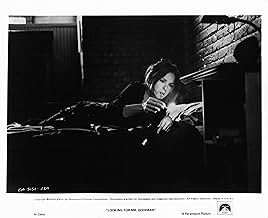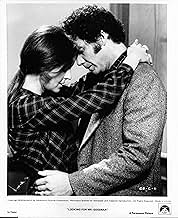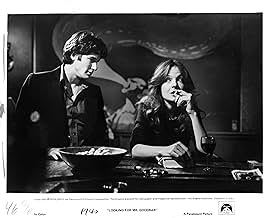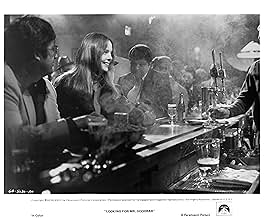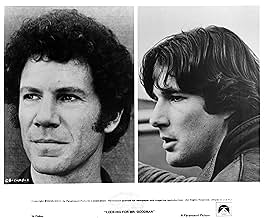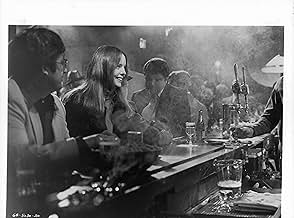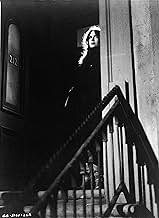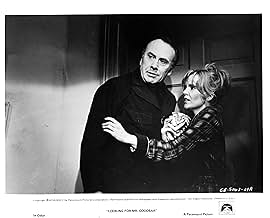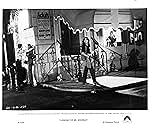AVALIAÇÃO DA IMDb
6,7/10
9,3 mil
SUA AVALIAÇÃO
Uma dedicada professora passa as noites em bares, procurando homens abusivos com os quais possa ter encontros sexuais progressivamente violentos.Uma dedicada professora passa as noites em bares, procurando homens abusivos com os quais possa ter encontros sexuais progressivamente violentos.Uma dedicada professora passa as noites em bares, procurando homens abusivos com os quais possa ter encontros sexuais progressivamente violentos.
- Direção
- Roteiristas
- Artistas
- Indicado a 2 Oscars
- 1 vitória e 6 indicações no total
- Direção
- Roteiristas
- Elenco e equipe completos
- Produção, bilheteria e muito mais no IMDbPro
Avaliações em destaque
It was searching for a copy of this that led me to a source of otherwise unavailable films but the lengthy running time has put me off watching it, for some time. Also, I cannot now remember what got me intrigued by the title anyway. In any event the thing is now watched. It seems to me there is a bit too much of everything here, certainly Richard Gere and Tuesday Weld who are well over the top. Keaton is fine but her character begins to irritate halfway through, what with all her neediness and simultaneously thrusting of people aside, her wonderfully virtuous deaf classes, adding nothing whatsoever and the growing tedium of the shadowy scenes of sex and drugs. Brave of Keaton to take the role but if only Brooks could have kept it to something more like 90 minutes we would surely have had a much more succinct and effective movie. Too many characters to little effect and too many downers and not enough uppers.
Will they PLEASE release this on DVD! As of now, it's only available on PAN/SCAN VHS. ....Diane Keaton reinvents herself, going astray from her Annie Hall persona. Her character is complex and it's entertaining to watch her evolve or de-evolve. The mood is classic gritty 70's. Sometimes funny, sometimes sexy, sometimes bleak. ...The ending is of course what will stick with you forever. It's hard to tell what director Richard Brooks wanted to say with this, but none the less, it's a good ride. Highly recommended. Apparently it created quite a stir when it came out, and even today, critics like Leonard Maltin still bring it down saying it's lewd and pointless. You be the judge. Like it or not it's still a good period piece, showing the seedier side of one young woman's life in the city. I can't wait to get this and watch it again -- if the studio ever gets the nerve to release it. I give it a good 9/10.
I saw this movie when it came out in the '70's. Living in Marin County, we were all experimenting with our new freedom of sexuality, (Hot Tubs included). This movie should have been a wakeup call. But naive as I was, the night I saw the movie, my friend and I went to a local pub afterwards. I met a handsome fellow and he invited me to his home nearby, where he said he had a warm fire going. I told him of the movie and made him swear he wasn't a Mr. Goodbar (in a joking, yet serious way). But dummy me, I believed he was OK, and the man turned out to be someone you'd rather not go home with. Nothing too drastic happened, but I didn't go home with strangers again. I also became a "poster child" or should I say the voice of reason regarding the fact that "free love" was really not what we were looking for. Women are usually looking to be loved, and although we now had choices, this choice was a poor example of what we really needed.
Tonight my boyfriend and I were listening to Could It Be Magic by Barry Manilow, and I could picture the ending with that music playing and the lights flashing, and the rest of it which as you already know is unforgettable. So much so, that it's something I wouldn't want to see again. At my age now, it just might be a little too much for my heart to handle, LOL
Tonight my boyfriend and I were listening to Could It Be Magic by Barry Manilow, and I could picture the ending with that music playing and the lights flashing, and the rest of it which as you already know is unforgettable. So much so, that it's something I wouldn't want to see again. At my age now, it just might be a little too much for my heart to handle, LOL
This was an interesting movie and it shows how the world has changed in the last 30 years. The attitudes (between men and women, gays and straights), the language used back then, the social atmosphere (bar scene) of the late 1970s, even the financial differences--she's able to afford an apartment in Manhattan on a teachers salary! (even though it has roaches this still isn't possible in 2006). All of these things made the movie interesting for me. I also imagine it must have been a very shocking movie back then. I was 8 years old when it came out so I didn't see it in the theater but I would have liked to see it in a theater just to see how people took it back then. I would have liked to walk out of the theater and hear the conversations going on as people walked to their cars. Did people like it back then? Did they think it was shocking? Did they think it accurately portrayed a type of person they maybe knew or were themselves back then? Also, Diane Keaton was very good in it and it's very interesting to see a young Richard Gere and Tom Berenger when their careers were just beginning.
Few viewers can deny the impact of this film on the '77 crowd and generations afterwards. As a curious 8-year-old up late watching HBO, I never forgot the story or the lesson. Based on a true story, Richard Brooks astutely translated Judith Rossner's best-selling novel to screen, choosing a luminous Diane Keaton, hot off `Annie Hall' and `The Godfather' to play Theresa Dunn, an up-and-coming Richard Gere, a quirky Tuesday Weld , and amazing Richard Kiley as Dunn, the overbearing Irish-Catholic father. The misogynistic Richard Atherton and an ominous Tom Berenger rounds out the solid cast.
Neither traditionally beautiful like her stewardess sister, Katherine or a baby factory like her other sister living at home with her, Theresa is the odd one out, the sister who is searching for approval from a father who barely acknowledges her existence. Childhood traumas mold her and make the fact that Theresa allows herself to be strong and fallible all the more powerful and endearing.
Tired of her father's unyielding rule, Theresa moves into the apartment building owned by Katherine's next attempt at a husband. As the women's freedom movement is underway, Theresa is caught in the position of questioning the traditional roles for women, roles against a new woman in control of her body and her sexuality. By day she teaches at a school for the deaf. By night her nightly jaunts into New York's seamier nightlife scene, expose the dichotomy of being a professional woman by day who must maintain credibility and responsibility, especially with young children while trying to be sexually active, experimental and suffering the stigma attached to both as whore and as a free woman wanting purely physical experiences much the same as men, yet realizing the label is different.
Throughout this film, Brooks explores Theresa's perpetual search for acceptance by men but a need to maintain her own identity. From a failed affair with a Prof. she was a TA to, to her fling with Tony, a local hustler, Theresa is perpetually in question of her sexuality and her allure for men, making poor choices in her partners only to endure their violence and possessiveness - much like her father. That she meets up with a homicidal drifter the New Year's Eve night she has decided to quit drugs and cruising, is the irony of her self-discovery.
The only positive male in her life appears to be is LaVar Burton's character, Cap Jackson, the sullen brother of one of Theresa's students. He is the only male presence in the movie that is not malevolent or trying to extract something from Theresa and during her altercation with Tony at the school, he is the only person to defend and protect her.
While the scare of AIDS stole later generations' promiscuity, this tale still resonates for viewers, especially for women on their own, looking for intimacy yet craving isolation.
While the ending tends to drag with one too many drug scenes the movie still packs a wallop for a finale.
Neither traditionally beautiful like her stewardess sister, Katherine or a baby factory like her other sister living at home with her, Theresa is the odd one out, the sister who is searching for approval from a father who barely acknowledges her existence. Childhood traumas mold her and make the fact that Theresa allows herself to be strong and fallible all the more powerful and endearing.
Tired of her father's unyielding rule, Theresa moves into the apartment building owned by Katherine's next attempt at a husband. As the women's freedom movement is underway, Theresa is caught in the position of questioning the traditional roles for women, roles against a new woman in control of her body and her sexuality. By day she teaches at a school for the deaf. By night her nightly jaunts into New York's seamier nightlife scene, expose the dichotomy of being a professional woman by day who must maintain credibility and responsibility, especially with young children while trying to be sexually active, experimental and suffering the stigma attached to both as whore and as a free woman wanting purely physical experiences much the same as men, yet realizing the label is different.
Throughout this film, Brooks explores Theresa's perpetual search for acceptance by men but a need to maintain her own identity. From a failed affair with a Prof. she was a TA to, to her fling with Tony, a local hustler, Theresa is perpetually in question of her sexuality and her allure for men, making poor choices in her partners only to endure their violence and possessiveness - much like her father. That she meets up with a homicidal drifter the New Year's Eve night she has decided to quit drugs and cruising, is the irony of her self-discovery.
The only positive male in her life appears to be is LaVar Burton's character, Cap Jackson, the sullen brother of one of Theresa's students. He is the only male presence in the movie that is not malevolent or trying to extract something from Theresa and during her altercation with Tony at the school, he is the only person to defend and protect her.
While the scare of AIDS stole later generations' promiscuity, this tale still resonates for viewers, especially for women on their own, looking for intimacy yet craving isolation.
While the ending tends to drag with one too many drug scenes the movie still packs a wallop for a finale.
Você sabia?
- CuriosidadesTom Berenger admitted in an interview that he had nightmares after he was finished shooting all of his scenes as Gary.
- Erros de gravaçãoTheresa is supposed to be a first-grade teacher, but all her students look to be way older. The youngest seem to be 9 or 10 while the oldest could be 12, 13 or even older.
- Cenas durante ou pós-créditosThe Paramount logo is shortened at both ends, fading in at the point the text already appears. It was gray-scaled in the closing version.
- ConexõesFeatured in Sex, Censorship and the Silver Screen: Forward Into the Past (1996)
- Trilhas sonorasTry Me, I Know We Can Make It
Written by Donna Summer (uncredited), Giorgio Moroder (uncredited) and Pete Bellotte (uncredited)
Performed by Donna Summer
Courtesy of Casablanca Record & FilmWorks
Principais escolhas
Faça login para avaliar e ver a lista de recomendações personalizadas
- How long is Looking for Mr. Goodbar?Fornecido pela Alexa
Detalhes
Bilheteria
- Faturamento bruto nos EUA e Canadá
- US$ 22.512.655
- Fim de semana de estreia nos EUA e Canadá
- US$ 1.540.635
- 23 de out. de 1977
- Faturamento bruto mundial
- US$ 22.513.584
- Tempo de duração
- 2 h 16 min(136 min)
- Mixagem de som
- Proporção
- 1.85 : 1
Contribua para esta página
Sugerir uma alteração ou adicionar conteúdo ausente


